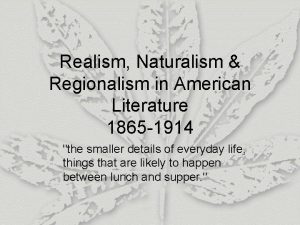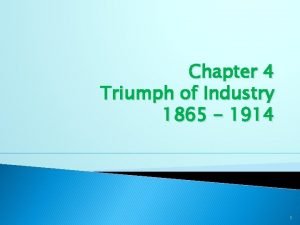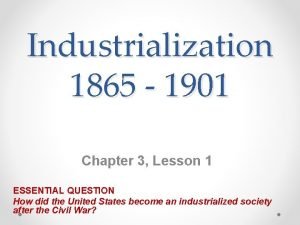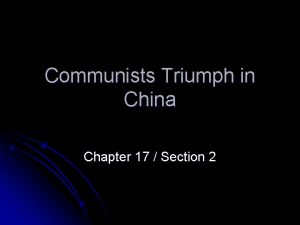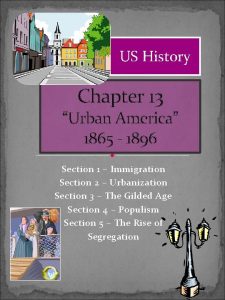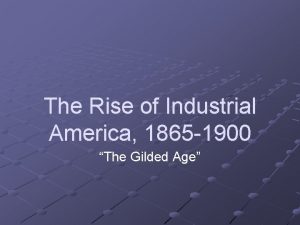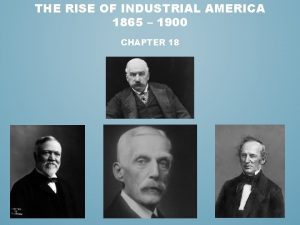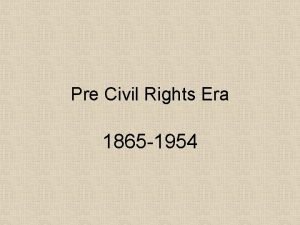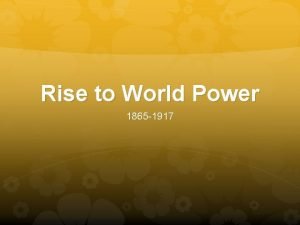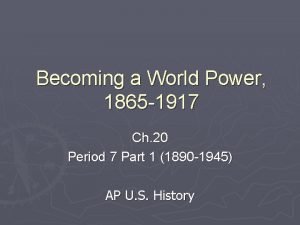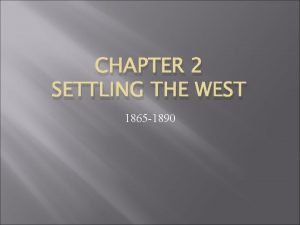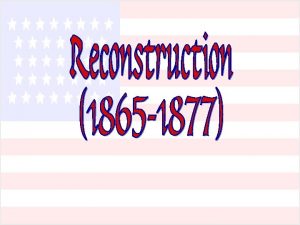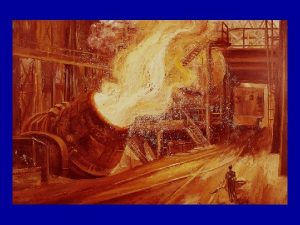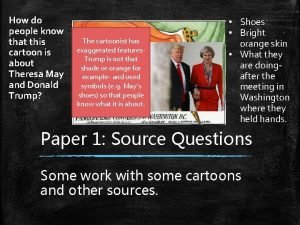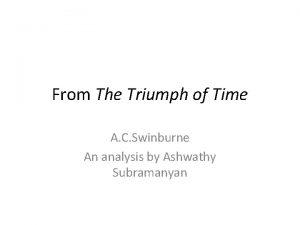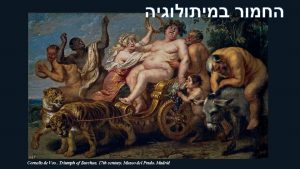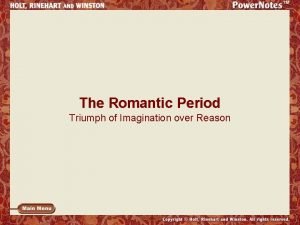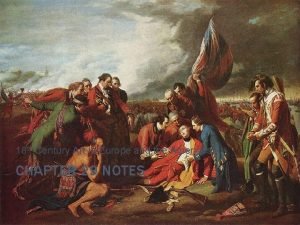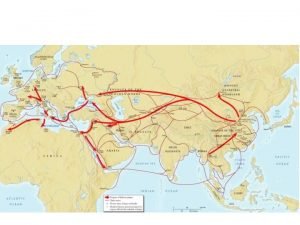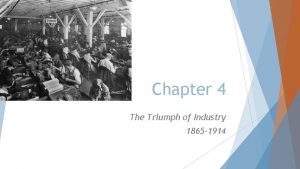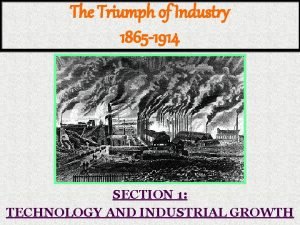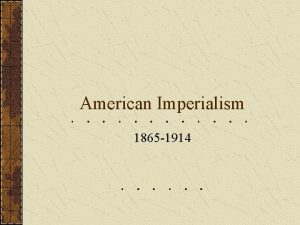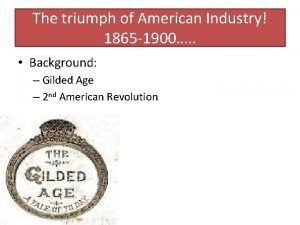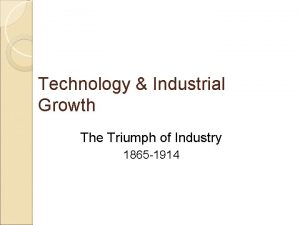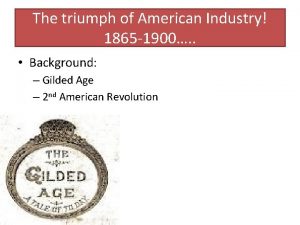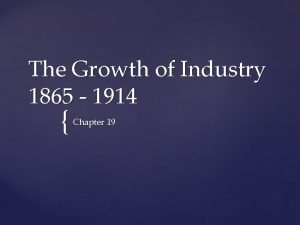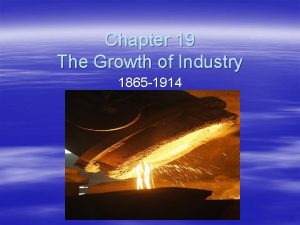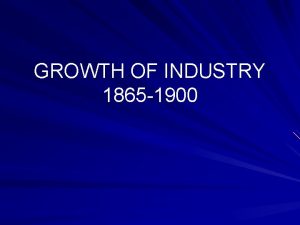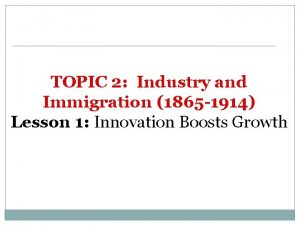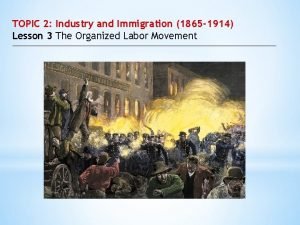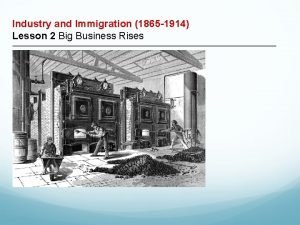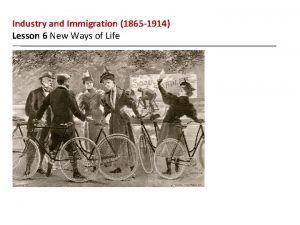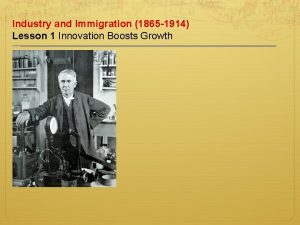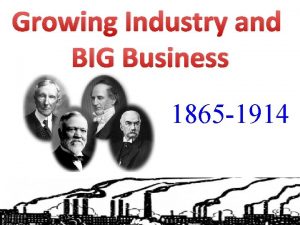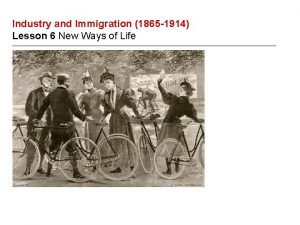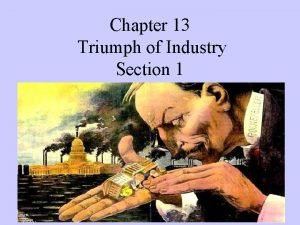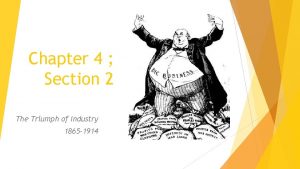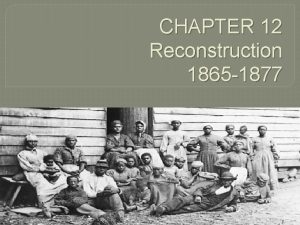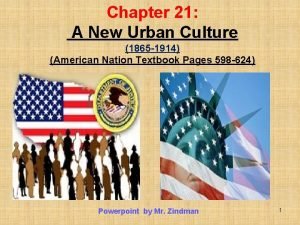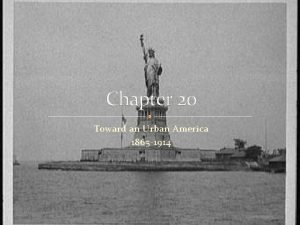Chapter 9 The Triumph of Industry 1865 1914



























- Slides: 27

Chapter 9 The Triumph of Industry 1865 -1914

Effects of the Civil War in industry Factories had to make products faster such as guns, ammunition and uniforms. Food industry had to process food so it could be shipped long distances Railroads expanded More efficient ways to get power were developed The Government encouraged immigration

Natural Resources We got energy from coal, lumber, and in 1859, Edwin Drake drilled the 1 st oil well in Titusville, Pennsylvania. 16 As a result the oil industry grew exponentially!

Immigrants flooded into America from South and Eastern Europe and Asia. 7 In 1881 about ¾ million immigrants came to America and quickly skyrocketed to 1 mil by 1900. They worked for low wages. In 1868, Horatio Alger published “Ragged Dick, or Street life in NY” which told about a boy who got rich by working hard. (“Rags to Riches”) 26 This book inspired many to be entrepreneurs The government also encouraged business through protective tariffs, Laissez Faire: Minimal government interference: Hands-off policies, and giving train company land so they could build coast to coast tracks.

And then there was light JP Morgan: A wealthy business man who financed a lab in NJ (Menlo Park) for 20 Thomas Edison: who invented the light bulb along w/ 1000’s of other patents. 5 George Westinghouse: the technology to send electricity over long distances and light up a city block. 25

Alexander Graham Bell 1844 – Samuel Morse invented the telegraph 1876 – Alexander Graham Bell invented the Telephone and by 1900 there were more than 1 million telephones. 4 In 1896, Marconi invented the wireless telegraph which would eventually become the radio.

Steel In 1850 s England, Henry Bessemer came up with the Bessemer Process which purified steel and made it strong and light. 17 The U. S. started mass producing steel and building skyscrapers, elevators and suspension bridges 1

Railroads Westinghouse made airbrakes for trains in 1869. Granville woods made a telegraph system. Gustavus Swift invented refrigerated train cars. Time difference between towns became a huge problem so in 1884, 27 countries got together and set up 24 time zones which the Railroads adopted. Towns popped up and cities used trains for subways so people could live in the suburbs and still get to work. Industries boomed because they could transport goods by train cheaply and fast. This also cause our exports to increase…we exported grain, steel and textiles

The Impact of Industrialization Farms became mechanized, limiting the number of needed laborers. This caused an Urban Migration! Some of those people moved to the city and worked in factories Industrial waste increased and Congress set aside land for National Parks… 1872 – Yellowstone.


Corporations: In which a number of people share the ownership of a business. Corporations began after 1870 because it was less risky than owning your own business and with it (ex. RR) you could expand your customer base. Same rights as an individual. They lowered the costs by paying workers very little and advertising; pooling capital Some corporations created monopolies (complete control of a product or service) or cartels (business’s making the same product limit their production to keep the prices high) Limited Liability


John D Rockefeller and Standard Oil Company 22 Standard Oil Company Started using Horizontal Integration: System of consolidating many firms in the same business. Trust: A group of separate companies that are placed under the control of a single managing board in order to form a monopoly.

Andrew Carnegie: Steel Tycoon 18+19 Andrew Carnegie – Steel Tycoon In the steel business he used vertical integration System of consolidating firms involved in all steps of a product’s manufacture. He wrote the Gospel of Wealth in which he preached that the rich should give away most gained wealth to the poor.


Other big businessmen Cornelius Vanderbilt – started in steamboats and then Railroads. 24 He got his competitors to pay him to relocate because his fares were too low.

Robber Barons or Captains of Industry? 29 Big time capitalists who were hiking up prices and putting other businesses out of business were called Robber Barons! Some believed that these entrepreneurs served the nation well and so they called them Captains of Industry because they provided jobs, universities, and libraries.

Social Darwinism Charles Darwin, On the Origin of Species, argued natural selection. Only the fittest survived to reproduce. Yale Professor William Graham Sumner applied Darwin’s theory to Social Darwinism. He declared that wealth was a measure of one’s inherent value and those who had it were the most “fit. ” Those who were poor should not be helped; therefore unemployment was one’s own fault. This theory was used to racism.

Responses to unfair business Interstate Commerce Commission (ICC) 1887: To oversee Railroads. The ICC could only monitor railroads that crossed state lines. It could not make laws or control the railroads’ transactions. Sherman Antitrust Act 1890: Outlawed any trust that restrained interstate trade or commerce. law had “no teeth”; was used against unions 42

Working Conditions Sweatshops: Factories where workers worked 12 hour days, 6 days a week. 14 Small, hot, dark and dirty. Horrible conditions. It was dangerous and workers were fined for breaking rules or working too slow. Children were working due to need. 32 1 in 5 children between the ages of 10 and 16 worked rather than attending school.

Company Towns Some workers were forced to live near their work in company towns. Workers were forced to buy goods at the “company store” at high prices. Sold goods on credit, but charged high interest. It was illegal to leave a job if you still owed money to the company.

Unions In the early 1800 s workers used collective bargaining to get better hours our wages. They would strike as one of the strategies. 40 The 1 st union was the National Trade Union of 1834. Open to all, but quickly disbanded. Around that time, socialism emerged, which is the idea that the public should control property and income and that wealth should be distributed equally Karl Marx and his Communist Manifesto denounced capitalism.

Knights of Labor 1869 -1890’s Founded by Uriah Smith Stephens and in 1881 took over by Terence Powderly. Actively recruited blacks and by 1885 had 700, 000 members of all races. Encouraged boycotts and negotiation to get out of dependence on wages but after several failed strikes (MO Pacific) and Haymarket it disbanded. 35

Samuel Gompers and the American Federation of Labor 37+38 Founded in 1886, the AFL of 100 unions devoted to a specific trade. Unlike the Knights of Labor, which allowed all types of workers, the AFL was made up of skilled workers. He set high dues to create a strike and pension fund. Worked for better wages, working hours and conditions Excluded women and blacks.

Riots Haymarket Riot: May 1 st, 1886 workers across the nation wanted a 8 hour work week and on May 4 th violence broke out in Chicago…dozens of protesters and police were killed, 8 were tried for murder and 4 executed. 36 The riot caused the Knights of Labor to “fizzle” out. Homestead Strike: In the summer 1892 Carnegie Plant cut wages and so the workers went on strike. Carnegie’s partner, Henry Frick sent in the private police and an anarchist tried to kill him…public opinion turned and they called off the strike. 44

Eugene Debs and the Pullman Strike 1894 The Pullman car company laid off workers and reduced wages by 25%. 45 Some workers tried to negotiate but Pullman fired them. They turned to the American Railroad union (an industrial union) led by Eugene V. Debs. 39 300, 000 left their jobs, disrupted Railroad traffic, and mail. President Cleveland sent troops to end the strike and Debs refused so he was arrested for conspiring against interstate commerce. The Supreme Court upheld the decision in In re Debs.

 Realism v naturalism
Realism v naturalism Chapter 4 the triumph of industry
Chapter 4 the triumph of industry Chapter 3 lesson 1 the rise of industry answers
Chapter 3 lesson 1 the rise of industry answers Chapter 17 section 2 communists take power in china
Chapter 17 section 2 communists take power in china Urban america 1865 to 1896
Urban america 1865 to 1896 St helen’s smelting co v tipping (1865)
St helen’s smelting co v tipping (1865) The rise of industrial america 1865-1900
The rise of industrial america 1865-1900 The rise of industrial america 1865-1900
The rise of industrial america 1865-1900 1954-1865
1954-1865 Becoming a world power 1865-1917
Becoming a world power 1865-1917 What are characteristics of impressionism
What are characteristics of impressionism Chapter 20 becoming a world power notes
Chapter 20 becoming a world power notes Settling the west 1865-1890
Settling the west 1865-1890 Gregor mendel 1865
Gregor mendel 1865 How did the term impressionism originate
How did the term impressionism originate 1877-1865
1877-1865 Industrialization (1865 to 1901 worksheet answers key)
Industrialization (1865 to 1901 worksheet answers key) 1865 to 1900 inventions
1865 to 1900 inventions Nikita atal
Nikita atal And now the next step cartoon analysis
And now the next step cartoon analysis The triumph of time by algernon charles swinburne
The triumph of time by algernon charles swinburne Triumph of bacchus
Triumph of bacchus The romantic triumph
The romantic triumph Beowulf hero archetype
Beowulf hero archetype Triumph group
Triumph group Triumph bonneville leistungssteigerung
Triumph bonneville leistungssteigerung Francois boucher triumph of venus
Francois boucher triumph of venus Triumph of death
Triumph of death
